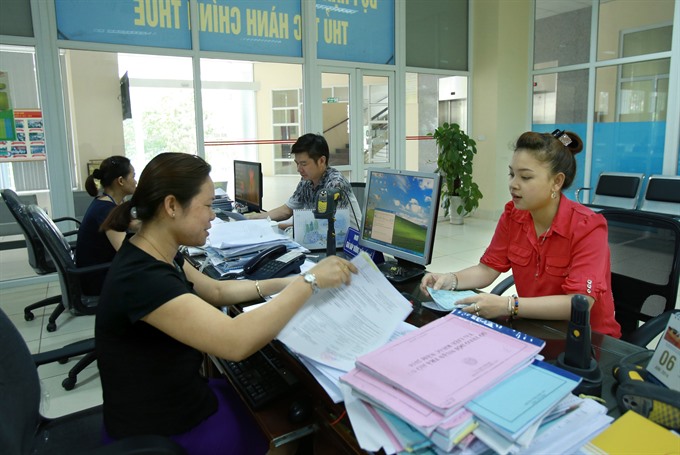The financial sector needs to work on a solution that helps reduce tax rates while still increase the total tax collection, said Deputy Minister Vuong Dinh Hue.

The financial sector needs to work on a solution to reduce tax rates but still increase the total tax collection.
That’s the message from Deputy Minister Vuong Dinh Hue who was speaking at a conference in Ha Noi on Wednesday.
The conference was held to review the performance of the financial sector in the first six months of this year and set out tasks for the second half.
“Tax reform doesn’t mean distorting tax policies,” Hue said, adding that the Ministry of Finance (MoF) should carefully review the effects of tax reform procedure.
The amendments and supplements to tax laws, including real estate laws, should be studied in line with the real situation of Viet Nam, Hue added.
The Deputy PM also praised the MoF’s decision to not raise the value added tax, adding the decision was considered as being responsible and having a positive impact on the market.
Deputy PM Hue hailed the sector’s efforts to complete the State budget collection targets in the first six months and called on the sector to make greater efforts to exceed the estimate of State budget collection set by the National Assembly by 3 per cent this year.
In order to achieve the goal, taxation and customs agencies should devise drastic and continuous measures to well manage tax payers and sources, Hue said.
Attention must be paid to intensifying supervision and transparency of budget collection, especially in the fields prone to corruption and wastefulness but at the same time strengthening inspections to limit tax losses and prevent smuggling and trade fraud.
Regarding budget expenditures, Hue said it is necessary to intensify fiscal disciplines and tighten the management on expenses, especially money spent on receptionists, festivals, conferences, public procurement and overseas business trips.
Hue, who is also head of the Government’s Steering Committee on Price Management, said the MoF must apply measures to curb year-on-year inflation in 2018 at below 3.7-3.9 percent.
He insisted on the strict control over the prices of essential commodities and services like pork, rice, petrol, cooking gas and medical examination and treatment services.
This, he said, would help avoid goods hoarding and rising prices at the end of the year while preventing inflation rising.
The total State budget revenue reached VND651.7 trillion (US$28.7 billion) in the first half of this year, equivalent to 49.4 per cent of the estimate and up 14.3 per cent year-on-year, Deputy Minister of Finance Huynh Quang Hai told the conference.
Revenue from crude oil achieved 82.4 per cent of its estimated value, which was up 25.3 per cent against the same period last year. Revenue from export-import activities and domestic revenue fulfilled 54.9 per cent and 47.6 per cent of their estimates, representing year-on-year increases of 6.9 per cent and 15.5 per cent, respectively.
However, the Ministry of Finance said revenue from state, non-state, and foreign-invested businesses remained low, accounting for only 43.7 per cent, 47.8 per cent, and 38.7 per cent of the estimates.
Of the total revenue, the central budget collection made up 46.2 per cent of the estimate, compared with 41.5 per cent last year, and the local budget collection was equivalent to 54 per cent of the estimate.
Meanwhile, budget spending stood at about VND649.2 trillion, or 42.6 per cent of the estimate.
Hai said the ministry will continue to build institutions and policies, and make the best use of incentives to promote production and business, thus giving a boost to the national economy in the remaining months of the year.
At the same time, the ministry will step up administrative reform and raise the efficiency of state management, especially in the tax and customs sectors, while improving the business environment and national competitiveness in line with the Government’s resolutions.
To complete the State budget collection targets assigned by the National Assembly, the ministry will work harder to prevent revenue losses, smuggling, trade fraud, and tax avoidance.
It will also intensify tax inspections, handle tax debts, increase price and market management, improve the quality of the financial service market, and help finalise accounting and auditing markets. — VNS





